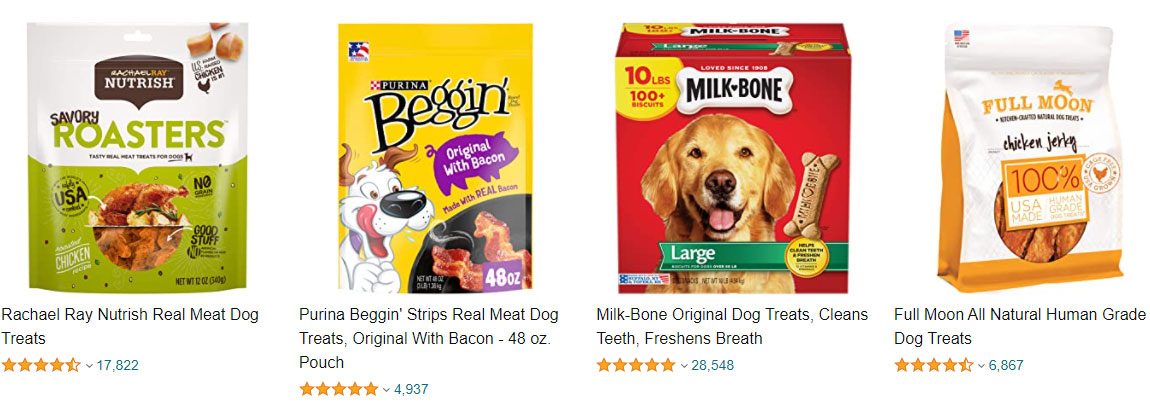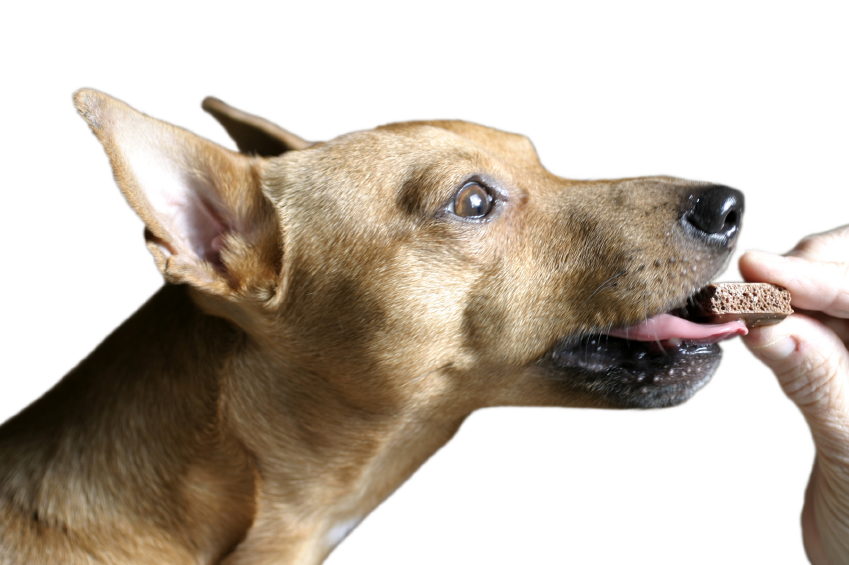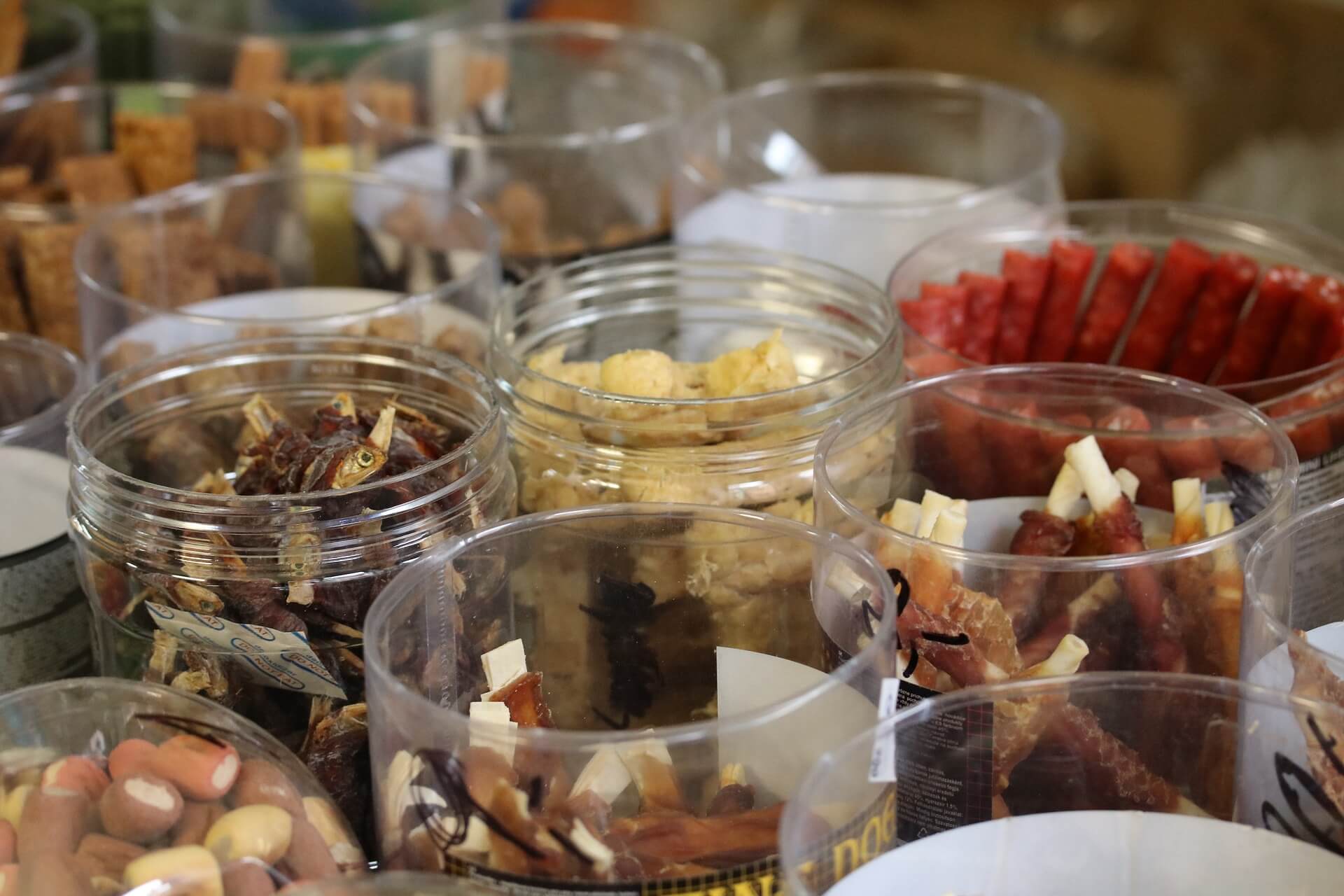Good dog treats
Dog treats have their aficionados as well as their detractors, and we hear both good and bad things about them from dog experts.
Indeed, while some owners swear by them to gently educate their pets, others accuse them of all the evils, including making dogs fussy ... Or obese.
To avoid falling into the trap of those who are addicted to treats or those who avoid them like the plague, here are a few tips on how to choose the right treats for your dog and, above all, how to use them as part of a balanced diet.
What are dog treats?
The equivalent of human candy, dog treats are small treats that owners give to their pets outside of mealtime, often as a reward or to show love.
Most treats are designed to be appetizing and to keep your four-legged friend hungry - and interested.
There are many different kinds: organic, homemade, industrial, natural, gluten-free...
In fact, some of them correspond better than others to certain dogs, depending on their age, their health, their weight... But also on their taste!

What are the different types of dog treats?
Among the vast choice of dog treats available on the canine market, we can distinguish between industrial and homemade treats.
Industrial treats
Most of the time, the owner sees "homemade" treats as a healthier reward to give his dog, as opposed to industrial products whose composition is often opaque. On the other hand, industrial treats are often seen as cheap food, made of dubious animal meals and suspect additives.
However, there is a very large variety of them, whose composition has evolved with the mentalities of the owners, for whom the health of their animals is more and more important. For example, it is possible to find cereal-free and/or gluten-free treats, which are suitable for animals with a fragile digestive system.
There are also organic treats or treats made only with quality ingredients that meet the same requirements as those for humans. Finally, there are industrial treats that are all-natural and made of only dried meat pieces.
Homemade treats
Homemade treats also offer a wide choice of ingredients and flavors to owners who can let their imagination run wild in making these little treats for their dogs. This solution allows owners to know exactly what is in the treats they are giving to their pet, but also to better control their budget.
Indeed, homemade treats are much less expensive than industrial treats, especially if they are good quality premium foods. However, they will be more expensive than low-end treats, but they are much better because they usually contain too much sugar, fat, additives and meats of dubious origin.
However, owners who choose to make their own treats for their dogs must avoid certain ingredients that are harmful to their companions' health. Garlic, onion, grapes, chocolate, yeast, leeks and salt are all toxic to our four-legged friends.
Other foods, although not toxic, should also be avoided or your pet will suffer from digestive problems. These include milk, starch and too much fiber. In other words, while making homemade treats is great for the owner's budget and the dog's health, it's also relatively restrictive.
Which treat for which dog?
There are so many different types of treats on the market because every dog is different and not all treats are suitable for every dog. Different criteria should be taken into account to find the sweet that will please your faithful companion without harming his health
Age and weight
Overweight dogs or those prone to obesity should avoid treats in general, especially those that are too fatty or too sweet. We are thinking here mainly of Beagles and Labradors, but there are many other breeds of dogs known for their ability to swallow anything in less than two hours and to become fat in no time...
For this type of dog, I recommend that you opt for natural treats (jerky, for example) or homemade "light" treats. For young puppies, soft treats should be preferred to crunchy ones until all their teeth have developed properly.
The same is true for older dogs with weak teeth or tired jaws. Also, beware of gluttonous puppies who may swallow treats whole, risking choking. Be sure to use safe foods and keep a close eye on your puppy as you hand out some well-deserved candy!
Health
Some dogs are a little more fragile than others or are undergoing treatments and/or diets related to an illness. If your pet is diabetic or has kidney failure, I advise you to consult your veterinarian before giving him treats.
Your veterinarian will be able to help you choose products that are safe for your pet. Other pets are simply allergic or intolerant to certain substances, as is often the case with gluten or high-fiber grains. If your dog has skin reactions or digestive problems, the best solution is to consult a veterinarian to find out if his diet is the cause and, if so, to find the most suitable treats.
The character
Some dogs are not really greedy, as is the case with Shiba Inu dogs, who tend to be completely uninterested in any treats their owners might offer them.
If you still need to find a stimulating reward system for your pet, turn to appetizing treats specifically designed for picky eaters. Another option may be to start making homemade dog treats, using ingredients that your dog seems to enjoy.

How do you give your dog treats?
Once you've found the right treats for your pet, it's time to give them out with love. However, there are some rules to follow to prevent your pet from becoming fussy or simply misunderstanding your intentions.
If your pet is already perfectly trained and you're just looking for an occasional treat to give him for fun, then the method of giving is of little importance. If, however, you're going to use treats as an educational tool to motivate and reward your pet, you'll need to follow a few best practices to be effective.
The choice of timing
When training a dog, it is crucial to be very consistent so that your dog understands your expectations and can remember and associate each command with a specific action. The distribution of treats must be done according to the rules of the art: immediately after a good behavior, preferably called by a command.
However, it is possible to reward good behaviors that have not been requested when you want to see a bad behavior disappear and/or encourage a change in attitude. For example, a dog that has just done his business outside when he usually has cleanliness problems can be perfectly rewarded.
Outside of these special situations, it's best to reserve treats in response to your four-legged friend's obedience. For the treat system to work well, the owner must also maintain some control over the feeding pattern.
In particular, treats should not be systematic in order to keep your pet's interest. It's important to give them sparingly and to avoid getting your dog used to them, otherwise he may disobey when he realizes that there are no more treats in play.
The owner's attitude
In order to properly educate your pet with treats, the owner must also be consistent and intelligent. He must take care to associate the gustatory reward with a verbal reward or a few caresses if his dog appreciates them.
Also, he must pay attention to his pet and not offer him candy to get some peace and quiet or to distract his dog without having to take care of him. Treats are not intended to compensate for the lack of demonstration of satisfaction by the owner when the dog is obedient or performs a desired behavior. They are only meant to reinforce the owner's training methods, not replace them.
The use of treats to educate your dog is a personal choice, depending on the convictions of each owner and the health of his pet. To prevent your dog from becoming overweight if you decide to give him treats, remember to adjust his daily kibble ration according to the amount of treats given.
Finally, if your dog has health problems or food intolerances, don't hesitate to consult your veterinarian about the best choice of treats to give him. Do you use treats to reward good behavior? What are your favorites, and when do you give them?
How do I choose the best diet for my dog?
For me, the easiest way is to trust the recognized professionals of the sector. This gives you the assurance to give your dog the right products while simplifying your life. For example, I recommend Ollie's products.
It is a company with an excellent reputation that prepares customized recipes for your dog, 100% fresh and delivered directly to your home.


